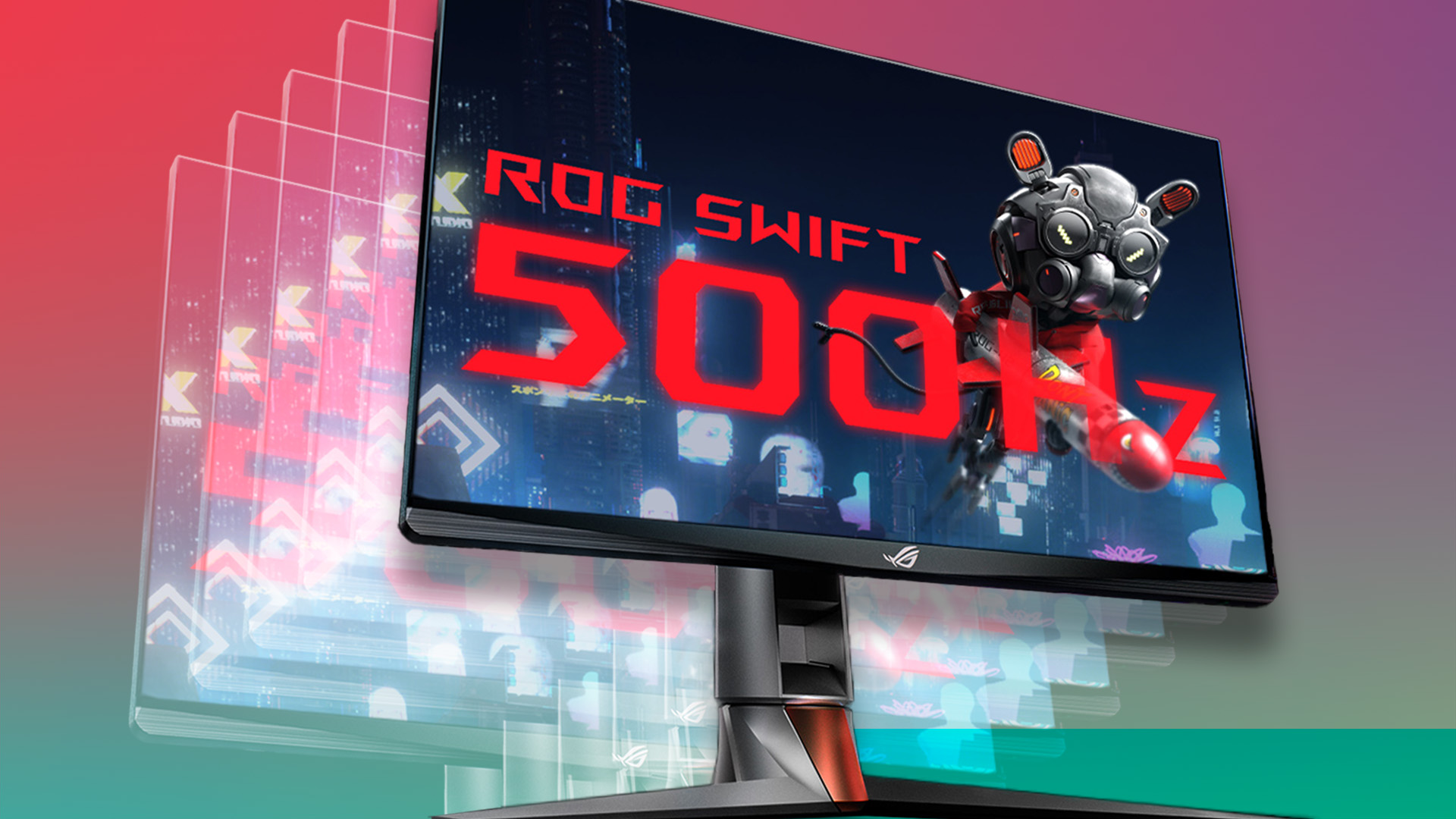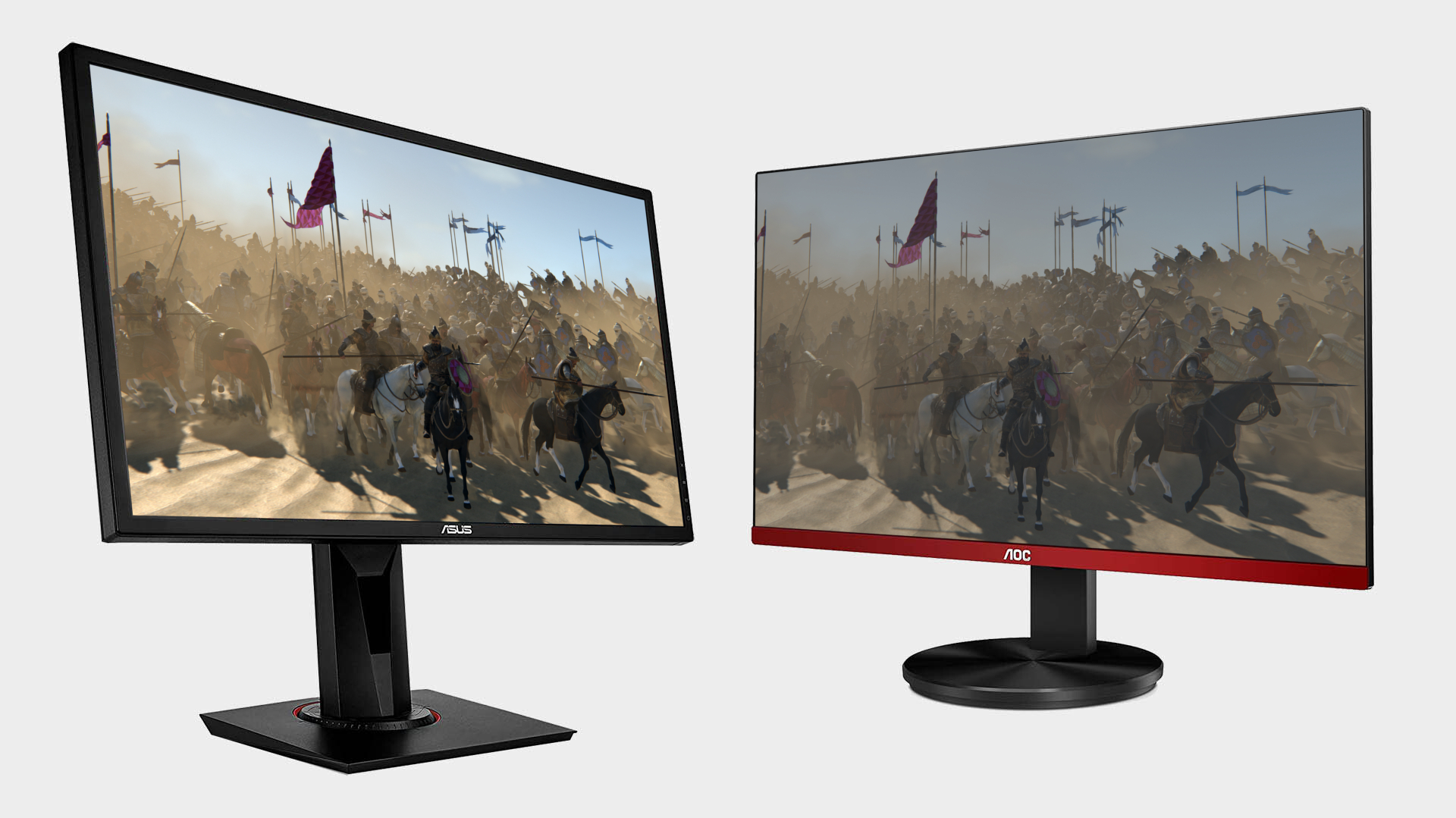That Asus 500Hz gaming monitor isn't for us
We're not competitive enough for that sort of speed. And at least 75% of us aren't young enough, either.

Computex has basically wrapped up for us gamers now, which might sound surprising to you if you didn't have a clue it was on. It's true, the show did happen in this year, in-person in Taipei no less, but it's not been a massive event for PC gaming news. Most of the stuff we care about came from AMD's keynote speech—where it announced more details on its upcoming Zen 4 processors—and Nvidia's surprise announcement of a 500Hz gaming monitor in collaboration with Asus.
Indeed, a 500Hz monitor is a pretty spectacular claim. The ROG Swift has been upgraded once again to deliver an even more extreme refresh rate than in year's gone, and one that easily runs circles most of today's best gaming monitors. I thought 165Hz was neat, but then my dreams were crushed by 240Hz, then 360Hz, and now 500Hz.
You could try to keep up with the pace of change, but should you bother? We've surveyed the PC Gamer team for their thoughts on the matter, and since none of us are esport professionals—arguably the only valid customers for this screen—we've fairly unanimously decided it's not for us.
Here's what we think about the Asus 500Hz monitor announcement
Dave James, Hardware Lead: This was probably the only thing of note from Nvidia's torpid Computex keynote, and even then it feels like it was just a 'look at the big number' kinda thing. Now, don't get me wrong, I love a high refresh rate monitor, but trying to sell it to the PC gaming public as something which is going to make you a better gamer feels a little of a stretch.
I've no doubt that every esports athlete in a championship would choose the 500Hz screen over a 144Hz option.
That stems from the long-held belief in hardware marketing—stretching all the way back to Wendel Fatalonety's tag being strapped to anything and everything—that anything which might appeal to professional gamers will automatically create fervent demand in the whole PC gaming community at large.
The high-refresh rate latency argument, which has cropped up with AMD and Nvidia chasing down ways to cut gaming latency down, is one that can be made with empirical data, however. Higher refresh rates, means lower latency, means you will see something on screen ahead of someone who is not operating at such high levels. Though it's by the finest of degrees that you've got to be talking about the infinitesimal differences that would only create a performance delta at the very top of elite esports.
I've no doubt that every esports athlete in a championship would choose the 500Hz screen over a 144Hz option, but at home it's not relevant to the greater part of the PC gaming ecosystem. I would say I'm also a snob. I'd much rather have the glorious 1440p Alienware OLED at 175Hz than some little 1080p TN screen, even if it does have a 500Hz refresh rate.
Keep up to date with the most important stories and the best deals, as picked by the PC Gamer team.
As I believe I've said before, wake me up when you can give me a 1ms refresh rate and response time, then we'll talk. And not on a damned twisted TN panel.
Above: Nvidia outlines the benefits of 500Hz.
Jacob Ridley, Senior Hardware Editor: Faster is better when it comes to gaming monitors. That means always using a TN panel and never opting for 4K, right? Clearly, that's not always the case. Quality is important, and the overall clarity, colour, and contrast of a panel makes all the difference to a well-rounded gaming experience. Those are qualities you don't see much of with a heavily sped-up TN panel, like those most often found in the quickest gaming monitors today.
Speed is important, it's just not the be-all and end-all for most PC gamers. Like Dave says, there's a difference between the esports pro and a high-ranked competitive player that's unaffiliated to any team or league. There's an even bigger difference between me, an avid PC gamer, but not often a highly ranked one, and an esports pro. Sometimes that esports speed freak mindset seeps into the more general PC gaming soup, looking to trick us into thinking we could be the best of the bunch. But your esports pro is anything but your everyday gamer; what an everyday gamer actually needs to do is knuckle down and play 10,000 hours in-game to actually get good. In my case, that would also involve picking up a time machine and going back 10 years to when I was apparently in my competitive gaming prime—if only I knew those nights of playing Ghost Recon: Advanced Warfighter in a competitive league would be my finest hours.
I love a high refresh rate monitor but I'm probably not going to benefit from a 500Hz one. That said, I do see the appeal in terms of dramatically lowering overall latency to near-indistinguishable levels. Would a 360Hz monitor deliver much of the same benefit? Mostly, yes. But then that's not really in keeping with the PC gamer spirit of going overboard all the time, is it?
Even if there's no real benefit I'm sure a few manufacturers would love to hit 1,000Hz.
And, hey, for the esports pro: I get it—at least in the few games that might be able to run at 500fps with the right gear. It's not like every game will run at that sort of speed, nor will any old graphics card be able to realistically hit the lofty frame times required to get there.
Similarly, it's not just about the quality of your GPU at 1080p and high refresh rates. Your CPU will play a major role the more you drop down your resolution and chase faster frame times.
But just how far can gaming monitors go before these diminishing returns are no longer worth it even for the professionals they're primarily designed for? Even if there's no real benefit I'm sure a few manufacturers would love to hit 1,000Hz.
I'm keen to try out this 500Hz monitor from Asus, anyways. If only because I remember viewing the first 360Hz monitor out of Asus back at CES 2020 and actually finding it rather impressive. These cutting-edge monitors often come with nice 1080p TN panels at the very least, and with G-Sync they don't look half-bad in motion, either.
Ted Litchfield, Associate Editor: There's a phenomenon in amateur sports where someone new to competition immediately springs for the flashiest, most expensive gear associated with the hobby before even knowing they'll stick with it. Couch to 5k runners with $200 trainers and a GPS watch, casual cyclists compelled to purchase carbon fiber parts, and lifters showing up to their third week at the gym with a $240 supportive belt all reflect the phenomenon.
What do these deep-pocketed dilettante gearheads all have in common? The respect of their peers and sustained competitive success, that's what! This monitor has to be the ticket to FPS excellence for the aspiring MLG pro, the big numbers do not lie. Aimless to aimbot, Bronze 9 to Good-at-the-Game 1. I've been delaying my esports career for the release of just such a monitor.

Katie Wickens, Hardware Writer: Imagine being so hung up on high numbers that you forget about everything else that matters. I'll shout it until the cows come home: There's more to gaming monitors than just speed! Concentrate on colour accuracy, epic contrast ratios, great viewing angles. Maybe spend more money designing more eco-friendly gaming monitors, for crying out loud.
A 500Hz monitor isn't going to make you a better gamer if you already suck.
And really, who are we fooling, even a 500Hz monitor isn't going to make you a better gamer if you already suck. Sure, we're all about 'future-proofing' your setup, but how far into the future are we thinking, here? Maybe when my eyes are riddled with cybernetics, I'll be able to tell the difference. Right now, you're hardly ever going to generate enough frames per second to make the most of a refresh rate like that—even if you've managed to bag an Nvidia GeForce RTX 3090. Also the 'the lowest possible input lag' is not a number and doesn't help me make an assessment, Asus.
I'm not a competitive gamer, so none of this would make a difference to me for the most part… What I will say is this: We may have gone too far with this one.

Alan Dexter, Senior Hardware Editor: I'm in the lucky position of having the Alienware AW2521H hooked up to my my gaming PC at home. For the uninitiated that's a 360Hz monitor. In theory this should make me a godlike gamer in the likes of Valorant, Apex Legends, and any other competitive esports title I can turn my hardware prowess to. In reality it merely highlights that I'm not as good at these games as I think I am.
Am I interested in a 500Hz monitor? No, not at all.
If you're used to gaming on a 60Hz panel, then grabbing a 120/144Hz panel makes a big difference, and there's a genuine chance you'll be able to react quicker than your 60Hz self. The benefit of jumping to 240Hz isn't quite so obvious. And 360Hz is already pushing the definition of beneficial, at least it is for me. 500Hz is merely going to highlight how lacking I am even further.
I'm sure there are esports wunderkinds out there that will be amazing on a 500Hz monitor, but my reactions are nowhere near the level where it'd make a difference. The fact that such panels are very much stuck in 1080p-land is what ultimately turns me off, though—I'd much rather a 144Hz 4K screen for the kind of games I mainly play.

Best gaming monitor: Pixel-perfect panels for your PC
Best high refresh rate monitor: Screaming quick screens
Best 4K monitor for gaming: When only high-res will do
Best 4K TV for gaming: Big-screen 4K PC gaming
Jorge Jimenez, Hardware Writer: The fact most people haven't experienced gaming at 360Hz, 500Hz might as well be 1,000Hz. Hell, I only started playing games on a 240Hz display and it wasn't the life-changing experience I was expecting it to be when I upgrade from 144Hz. The reality is only small number of people will even have the hardware to even run a game comfortably at 500Hz.
With all the talk of future-proofing, I don't think we've unlocked the current potential of display that already exist. If we really want to future proof, give 240Hz on a 4K screen. I don't play competitive shooters but I want the smoothest best looking experience. I'm not trying to play CS:GO or Valorant at 500 fps, I don't even like those games.
That being said, do I want a 500Hz 1080p display? Yes. Of course, I do. I'm a hypocrite.

Jacob earned his first byline writing for his own tech blog. From there, he graduated to professionally breaking things as hardware writer at PCGamesN, and would go on to run the team as hardware editor. He joined PC Gamer's top staff as senior hardware editor before becoming managing editor of the hardware team, and you'll now find him reporting on the latest developments in the technology and gaming industries and testing the newest PC components.
- Jorge JimenezHardware writer, Human Pop-Tart
- Katie WickensHardware Writer
- Ted LitchfieldAssociate Editor
- Alan Dexter
- Dave JamesEditor-in-Chief, Hardware


